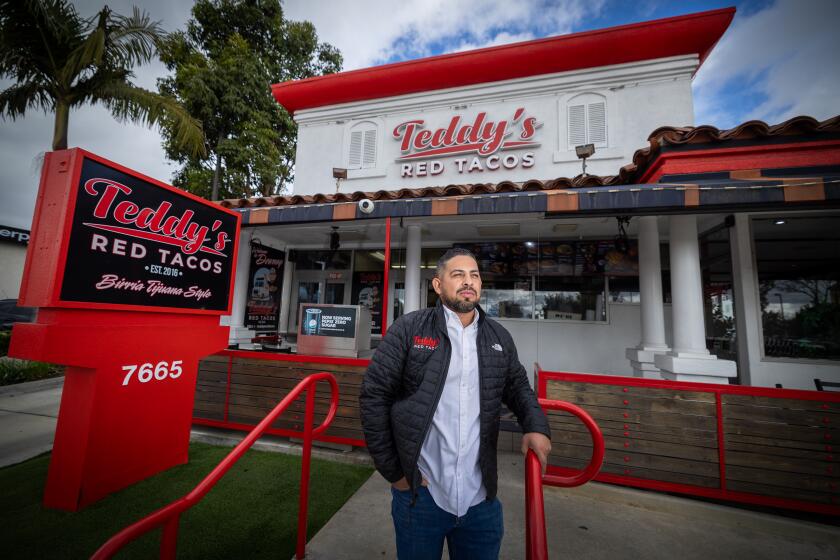Korean, Black Merchants Seek Peaceful Niches
- Share via
Many small markets were destroyed or forced to close during last spring’s riots. Ryan Song of the Korean-American Grocers Assn., which has 3,500 local members, and Etha Robinson and Byron Jamerson of the fledgling 75-member African-American Food Assn., discussed their groups’ efforts to develop understanding and cooperation. The 17-year-old Mexican American Grocers Assn., which has 12,000 members , declined to join the discussion. The round - table talk was conducted by Laurie K. Schenden.
*
Q: The African-American Food Assn. was just formed in January. Did the riots uncover a need for this type of organization?
Robinson: I don’t think it moved faster because of the unrest; I think it moved faster because I had the time to pursue it. The concept started about three years ago when I tried to market my cookies and I couldn’t find any avenues to support me. I called all the major bakers in Los Angeles--African-American bakers--to assist me and I couldn’t get any. I figured there must be a retail bakers’ association or something, but they weren’t concerned about folks like me.
Jamerson: We African-Americans have never really been focused, never had the opportunities from the manufacturing side, from the distribution side or from the retail side. We obviously participate as consumers, and there’s an awareness that there’s more opportunity than we’ve previously realized. We’re looking to make some alliances with some existing organizations--to go in and get our own niche.
*
Q: How and why did the Korean-American Grocers Assn. get started?
Song: The group started as kind of a business association which addressed common problems, such as contacting suppliers, getting the recognition and also getting their relationships established. We had the same kind of interests as people who were in other occupations: to get together and see what kind of concerns they can address. Now, 10 years later, especially after the riots, because we have a large number of people, we have been getting into other areas: government relations, community relations, public relations.
*
Q: Have Korean businesses become an important part of the community?
Song: Yes, especially in the South-Central area, where the big markets would not go, and there are not many financial institutions. There are a lot of inner-city problems, and these grocers come in as corner markets, convenience stores where residents can walk to and from, rather than going miles to go to a big market. Also they provide check-cashing services . . . and a lot of stores run on a credit basis.
Robinson: The African-American Food Assn. is coming from another vantage point because there are many grocery stores, liquor stores and convenience stores already in existence. We’re not a large group of people who actually own stores or markets. My major concern was distribution. If you have a product, you need to have a method to get it where you want to sell it, and you need a place to sell it. Rather than each person doing it as an individual, we saw a need for there to be some way to make it more efficient.
*
Q: Korean grocers have been criticized by the African-American community of late. What is the association’s position?
Song: First of all, by just looking, our numbers have grown tremendously, but at the same time the riots kind of highlighted the fact that if you don’t have the political representation, we as a group can suffer. As much as we don’t want to get involved in politics, we were forced to. We’re trying be good grocers, to meet the communities’ needs without getting involved in too much politics. To our dismay, sometimes we have to play politics rather than be a good businessman.
*
Q: Why have Koreans had difficulties running businesses in the African-American community?
Jamerson: Where the Koreans have been remiss in their business approach is that they simply have transplanted a lot of people into the community and they do not support their stores; we support their stores. If there had been more PR, if they had done this as a partnership with the community, as opposed to coming into the community and simply extracting from it. . . . The best advertising is word-of-mouth. When the community finds out that there are African-American-manufactured products in those stores, we think we can sell our products not only in the black community but wherever there is a store.
Song: The respective communities have their own idiosyncrasies. The store owners are largely recent immigrants, and that entails a language problem. There’s not a deep understanding of the culture; the Koreans come from such a homogenous country. The African-Americans in South-Central are living under kind of a repression, economically and socially. It’s not entirely a racial matter, it’s partly environmental. I think the media is part of the problem. They portray things like the (Latasha) Harlins and Jones Market cases as an indication of racial tension, but they might have created the racial tension. The area is just a tough place to do business.
*
Q: Have the grocers made progress since the riots, getting more assimilated into the community?
Song: We are making more of an effort to reach out to the community. Our Scholarship Banquet gives 10 to 15 scholarships to minority students in areas we serve, mostly to African-American (and) Mexican-Americans. We participate in food giveaways in conjunction with other food suppliers. Internally we offer sensitivity training. We’re promoting a book, “African-Americans: Who Are They, Where Did They Come From?” which is written in Korean. Even before the riots we were in a program where we tried to provide jobs for people in South-Central. That was curtailed because of the riots, but similar programs can be contemplated.
Jamerson: We would like to be able to supply the stores, and that’s a partnership, that’s not trying to put them out of business. We want to do business with the Koreans. We’re not trying to say that the African-American Food Assn. is asking for something we’re not entitled to. As African-American consumers, we’d like to be able to sell some of our products. We’re saying that if you can carry Nabisco-brand cookies in the store, then you can carry Ms. Robinson’s Tea Cakes.
*
Q: What is it that draws so many Koreans to this business? Does it have to do with the support of the grocers association?
Song: What is attractive about this business is that even if you have a difficulty with the language or culture, if you’re willing to work hard, you can make a difference. I think the grocers association part comes after the fact. About two years ago we did a survey of our members; about 40% said that they came into this business because there was nothing else available.
*
Q: Are your groups, which seem to be separated by race rather than geography, now forging some kind of working relationship?
Song: We’re in the dialogue stage. We’ve met once and had a discussion of how food industry people can work together, and we’re at the stage where we’re presenting the idea to an organization of people. We are following the same paths as other groups--before it was the Jewish, Greeks and Italians, and now it’s Korean-Americans. It’s very family oriented, a very labor-intensive industry.
Jamerson: It is our intent to work together with organizations like this and through conversations with Mr. Song, we’ve reached the basis of how we can work together.
We, as an association, don’t plan to compete. The key is in providing our members with some professionalism, and I think that’s what’s been lacking. Initially it’s why we’ve really lacked the insight, the wherewithal of what it takes to be a food distributor or retailer.
*
Q: Do you think business has been racially divided in the past, where one group has done business only with certain people?
Jamerson: We plan to be advocates for business first, and for consumerism second. We plan to be an activist group.
If companies like Coke think we are going to continue to buy their product because somebody is slam-dunking a basketball or making a great commercial, we’re simply not going to buy into that anymore.
More to Read
Eat your way across L.A.
Get our weekly Tasting Notes newsletter for reviews, news and more.
You may occasionally receive promotional content from the Los Angeles Times.










